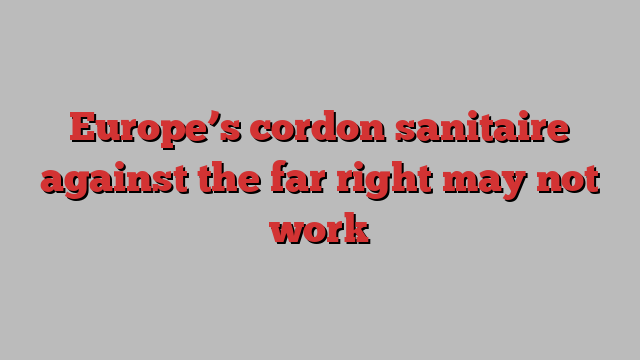
Unlock the Editor’s Digest for free
Roula Khalaf, Editor of the FT, selects her favourite stories in this weekly newsletter.
A spectre is haunting Europe — the spectre of the far right. The strength of populist, nationalist and illiberal forces in the European elections and in France’s ongoing legislative polls has provoked anguish across the political spectrum. In France, especially, there is panic over Marine Le Pen’s Rassemblement National.
But fear and loathing, however understandable against parties with a legacy of hateful rhetoric, are not adequate political responses.
Most of Europe’s political mainstream has doubled down on the cordon sanitaire, the ostracism of elected representatives to the right of traditional conservative parties. In campaigns this involves painting such parties as not just political adversaries but threats to democracy itself. When the results are in, the cordon sanitaire rules out parliamentary collaboration, let alone a governing coalition, with them.
It is time to admit that this approach can sometimes do more harm than good. Most obviously, it has not prevented Europe’s nationalist right from building up its voter support over recent decades.
Portraying a party as so outside a community’s political norms that it can never be allowed near power can backfire. It reinforces its voters’ sense that traditional elites treat them with contempt and neglect — part of what attracts people to protest movements in the first place. Devising ways to marginalise them can also undermine respect for democratic norms. If a party is always — regardless of its success, conduct and programme — prevented from influencing policy, how are its voters supposed to think democracy will give their grievances due consideration? What stake does such a party itself have in the norms?
Demonising parties working to detoxify themselves — and there are many — is risky. The RN has for some time cracked down on its most extreme racist elements and been on its best behaviour in the outgoing French legislature. That gives Le Pen a measure of credibility when she presents it as the most responsible actor on the political scene. For many apolitical voters, panicked warnings by other politicians will come across as hysterical and only make them more disposed towards the RN.
A few countries have dropped the cordon sanitaire. The Norwegian and Finnish experiences of admitting rightwing populists into centre-right coalitions is instructive. The realisation that a share of power was possible, and the public spotlight on them once they possessed it, induced them to polish some of their roughest edges and strike compromises to get some of their preferences enacted. The curious result in Norway was a boom in road building combined with high and rising carbon taxes.
In Sweden, a pact of parliamentary support broke the cordon sanitaire against the Sweden Democrats. It was and remains a nastier party than its Nordic counterparts, but the prospect of actual influence did motivate a shift away from racist aggression towards democratic responsibility. (Sweden and Finland bucked the trend of far-right advances in the EU elections.) Italian leader Giorgia Meloni’s party, too, has proved rather more pragmatic in office than expected.
This does not always work. Austria’s Freedom party does not look mellowed by a spell in government marred by scandals of corruption and Russian influence on the intelligence services. Hungary’s Viktor Orbán and Poland’s Jaroslaw Kaczyński used power to undermine democratic institutions. Let’s not even talk about Donald Trump.
But the truth is that Europe’s far-right parties are highly heterogeneous. That is why they punch below their weight in the European parliament. Their lack of coherence has allowed the centre to ignore them, but also mistakenly to ignore the political diversity that creates this weakness. There is a difference between pursuing ugly policies and aiming to subvert democracy.
In the Nordics, it was good for democracy to reward rightwing fringe parties on a journey towards respectability. But this must not be done with clearly anti-democratic parties such as Alternative for Germany. There the case for the cordon sanitaire remains sound.
What about the RN? Le Pen’s attempted dédiabolisation and the party’s frantic rowing back on its promises suggest an interest in being successful within the system rather than in tearing it down. Most of France’s elite does not believe this, and may be right. Perhaps the RN itself does not know.
Europeans must ask themselves how deeply they believe in their institutions’ civilising powers. Given where the polls have been moving, to trust the moderating effects of democracy may be our best hope.